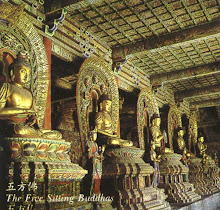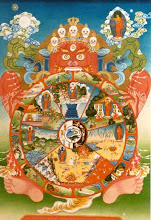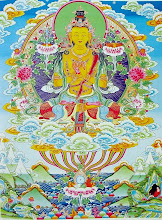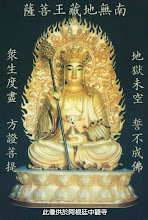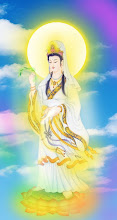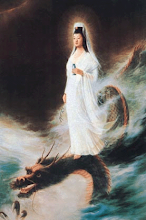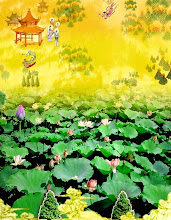佛說彌勒大成佛經
Translated from Sanskrit into Chinese in the Yao Chin Dynasty by The Tripitaka Master Kumārajīva from Kucha
Translated from the Chinese Canon, Vol. 14, Text no. 456
Sūtra no. 11 (posted 12/2007, updated 05/2008)
Thus I have heard:
At one time the Buddha was staying in the kingdom of Magadha, near the Pāśa Mountain, where past Buddhas often subdued the māras. It was during the summer meditation retreat, when the Buddha was doing walking meditation on the mountaintop with Śāriputra, that He spoke in verse:
"Hearken Single-mindedly!
In radiant great samādhi,
The one with unsurpassed virtue
Will rightfully appear in the world.
That one will pronounce the wondrous Dharma,
And all will be infused with it,
Like the thirsty drinking the sweet nectar.
All will swiftly set off on the Liberation Path.
At that time the four groups of the Buddha's disciples repaired and leveled the roads. They sprinkled water, swept the streets, and burned incense. [A huge multitude,] holding objects of offering, came to the assembly to make offerings to the Tathāgata and the bhiksus. Intently gazing at the Tathāgata, they were like filial sons beholding their father, or like the thirsty longing for a drink [of water]. In the same way they loved and thought of their Dharma father. With one mind they all wanted to request the Dharma-king to turn the right Dharma wheel. With their senses undistracted, one by one, their minds flowed toward the Buddha. At that time bhiksus, bhiksunīs, upāsakas, and upāsikās, as well as gods, dragons, spirits, gandharvas, asuras, garudas, kimnaras, mahoragas, humans, nonhumans, and others, all rose from their seats and circumambulated the Buddha to the right. Then they each fully prostrated themselves on the ground, shedding tears before the Buddha.
At that time Śāriputra the Wise straightened his robe and bared his right shoulder. Having been following the Buddha the Dharma-king, to turn the right Dharma wheel, he was the minister of the Buddha and a great general upholding the Dharma. Out of pity for the sentient beings, he wanted them to be liberated from the bondage of sufferings. Knowing that the Dharma-king's mind would be responsive, he said to the Buddha, "World-Honored One, just now the Tathāgata spoke in verse on the mountaintop, praising the one with the foremost wisdom. This has never been mentioned in previous sūtras. The minds of this huge multitude are now filled with expectation. They shed tears like heavy rain, hoping to hear the Tathāgata speak about the next Buddha Maitreya, who will open the Sweet Nectar Path. Maitreya Buddha's name, His virtue, His spiritual power, and His land will be sublime. Based on what kind of good roots, precepts, almsgiving, meditation, wisdom, and intellect will one be able to see Maitreya Buddha? With what mindset should one walk the Eightfold Right Path?"
When Śāriputra was asking this question, hundreds of thousands of god-sons and innumerable Brahma-kings, joining their palms reverently, spoke in one voice, also asking the Buddha, "World-Honored One, we pray that You will enable us in a future life to see Maitreya Buddha, the fruition of the greatest reward to all men, the illuminating eye of the Threefold Realm, who will teach great loving kindness and compassion universally to sentient beings."
The eight classes of Dharma protectors, joining their palms reverently, also made the request to the Tathāgata in the same way. At that time Brahma-kings and a multitude of Brahma-gods, joining their palms, sang their praise in one voice with a stanza:
"Namo the Full Moon!
Complete with the ten powers,
The leader of great energetic progress,
Valiant and fearless,
The one with all wisdom-knowledge,
Having transcended the Threefold Realm of Existence,
Having acquired the Three Thorough Clarities,
Having subdued the four māras,
His body being a Dharma vessel,
His mind vast like space,
Silent and unmoving
Toward existence and nonexistence,
And toward emptiness and non-emptiness,
With perfect understanding of śūnyatā,
One who is praised by the world!
We, with one mind,
Take refuge at the same time,
Praying that You will turn the Dharma wheel."
At that time the World-Honored One told Śāriputra, "I will expound broadly to you. Hearken, hearken, and ponder it well! All of you today, with a wonderful good intention, want to ask the Tathāgata about the unsurpassed bodhi work and the great wisdom, mahā-prajñā. The Tathāgata sees it as clearly as a mango in the palm. Śāriputra, if one has heard, under the past seven Buddhas, the names of Buddhas and made obeisance and offerings, for this reason, one's karma-hindrances will all be annihilated. If one has also heard of Maitreya Buddha's great loving kindness, one will attain a pure mind. You all should join your palms single-mindedly and take refuge in the great loving, kind, compassionate one to come. I will expound broadly to you.
"The land of Maitreya Buddha will be a land of pure life, with no sycophancy or deceit, because He does not embrace or cling to his attainment in dāna-pāramitā, śīla-pāramitā, and prajñā-pāramitā. It will be sublime because of His ten wonderful vows. When sentient beings, drawn by His great loving kindness, rouse their gentle minds, they will see Maitreya Buddha. They will be reborn in His land, tame their senses, and follow the Buddha's teachings.
"Śāriputra, [at that time] the water surface of each of the four great oceans will be reduced by 3,000 yojanas. Jambudvīpa will be 10,000 yojanas in length and in width. Its ground will be level and clean, like a crystal mirror. There will be large flowers that suit one's fancy, pleasing flowers, huge fragrant flowers, utpala blossoms, flowers with large golden petals, flowers with petals made of the seven treasures, and flowers with silver petals. The stamens of these flowers will be soft like celestial silk. They will bear auspicious fruits with aroma and flavor, which are soft like celestial cotton. In the forests, there will be abundant wonderful flowers and sweet fruits, surpassing those in the garden favored by the god-king Śakra. The trees will be 30 lis in height.
"The adjacent cities will be only a rooster's flight apart. Those who have planted good roots under the present Buddha will reborn in that world as the reward for their practice of loving kindness. They will be wise, virtuous, happy, and peaceful, as they gratify the five desires. They will not have illnesses caused by cold, heat, wind, or fire, nor will they have the misery of the nine afflictions. They will each live to 84,000 years in full, and no one will die a premature death. Their body will be 160 feet tall. Everyday they will enjoy wonderful peace and bliss, experiencing deep meditation as their instrument of happiness. They will have only three troubles: First, need to eat and drink; second, need to discharge bodily wastes; and third, need to grow old. Women will marry when they are 500 years old.
"There will be a great city called Kethama, which, adorned with the seven treasures, will be 1,200 yojanas in length and in width, and 7 yojanas in elevation. Inside will be magically-created towers made of the seven treasures, and they will be majestic, wonderful, august, and pure. Through the windows will be seen fair maidens, holding nets made with precious beads. These towers will be covered with various treasures as adornment and hung with jeweled bells, the sound of which resembles celestial music. Among the lines of trees made of the seven treasures will be waterways and fountains, also made of the seven treasures. The streams in various colors will reflect and highlight one another. Although crisscrossing in flow, they will not obstruct one another. The river banks will be entirely covered with gold dust.
"The streets and roads [of the city] will be twelve lis wide, all as fresh as a celestial garden sprinkled with water and swept clean. There will be a great dragon-king called Taraśikhin, which has merit and awesome powers. Its lake being near the city, its palace, like a tower made of the seven treasures, will be fully visible from a distance. At midnight he will assume a human form and fill an auspicious bottle with fragrant water. He will sprinkle this water to drench the dust until the ground looks as moist as if oiled. When pedestrians walk around, there will be no dust. This is [a reward] resulting from the merit of the people. Everywhere around the streets and alleys will be luminous beads mounted on poles, and their light, like the sunlight, will reach eighty yojanas in each of the four directions. This pure golden light will shine day or night. In comparison, the light of lamps and candles would be like pooled ink. When the fragrant winds blow, the luminous beads on the poles will rain down necklaces of jewels, and people will wear them as naturally as if they were enjoying the bliss in the third dhyāna. Everywhere will be gold, silver, jewels, precious beads, and so forth, piled up like mountains. These treasure mountains radiate light to illuminate everywhere in the city. Whenever illuminated by this light, people will all be happy and activate the bodhi mind.
"There will be a great yaksa named Bhadrapraśāsaka, who protects the city of Kethama day and night. Followed by the people, he will sprinkle water and sweep the ground clean. The ground will crack open to take in people's discharged waste products and close afterward, and it will grow red lotus blossoms to overpower the foul odor.
"When the people of that world grow old and frail, they will voluntarily go to the mountain forest to sit under a tree. As they keep thinking of the Buddha, they will die peacefully and joyfully without any fanfare. After death, most of them will be reborn in Great Brahma Heaven or before the Buddhas.
"In that peaceful land, there will be no trouble of bandits and thieves, robbing and stealing. The doors in cities and villages will never be closed. Nor will there be any catastrophes of water, fire, weapons, or troops; nor the tribulation of famine or harmful toxins. Taming their senses, people will live in loving-kindness, respect, and harmony. To one another, they will be like a son loving his father, like a mother loving her son. Taught and guided by Maitreya Buddha's loving-kindness, they will speak humble words. Their senses will be calm and their features even and straight, as awe-inspiring as those of celestial youths. Those who have been observing the precept of not killing and not eating flesh will, for this reason, be reborn in that land.
"The city of Kethama will be situated in the center of 84,000 small cities made of treasures, which will serve as its satellites. Men and women, adults and children, living near or far, because of the spiritual power of the Buddha, will be able to see one another without any obstacles.
"Everywhere in that world will be wish-fulfilling jeweled flowers that shine in the night. Flowers made of the seven treasures will rain down from the sky. Scattered all over the grounds will be blossoms of padma, utpala, kumada, pundarīka, māndarāva, mahā-māndarāva, mañjūsaka, and mahā-mañjūsaka. Some of them, swept up by the wind, will be whirling in the air. The bathing pools, fountains, rivers, and lakes in the gardens and forests near the cities and villages of that land will naturally have the water of the eight virtues. Singing wonderful tones will be geese, ducks, mandarin ducks, peacocks, parrots, halcyons, śārīs, melodious cuckoos, jīvajīvas, and the quick-sighted birds. Also flying and gathering in the trees and pools will be innumerable birds of diverse species, singing wonderful melodies.
"Blooming day and night and never wilted will be golden, untainted, pure-radiance flowers, carefree pure-wisdom sunlight flowers, bright white seven-day fragrance flowers, and fragrant campaka flowers in six colors, as well as hundreds, thousands, and tens of thousands of kinds of land and water blossoms, unmatched in fragrance and purity. The blue colors will radiate blue light; yellow colors, yellow light; red colors, red light; and white colors, white light. There will be trees bearing wish-fulfilling fruits, with their beautiful aroma permeating the land. Among the treasure mountains in the land will be fragrant trees, which will radiate golden light to pervade everywhere and emit pleasing scents to suffuse everything.
"At that time there will always be fine fragrance in Jambudvīpa, making it like a mountain of fragrance. Streaming waters will be good and sweet, which can remove troubles. Rainfalls will be timely and the heavenly fields will ripen aromatic and beautiful crops of grain. Because of the powers of these godlike people, seven harvests will be reaped from one planting. Only a little effort will yield much return. Without weeds or muck, the crops of grains will thrive. As a reward for the merit of these sentient beings, the grains, complete with a hundred flavors, unmatched in aroma, will melt in their mouths, providing them with strength and vitality.
"At that time, in that land, there will be a Wheel-Turning King named Rañca, endowed with the 32 major marks. He will have four types of armed forces, but he will not rule the four continents by military power. The king will have 1,000 sons, who are valiant and majestic, and enemies will naturally submit to them. The king will have seven precious things: First, the golden wheel, complete with the hub, the rim, and 1,000 spokes; second, the white elephant, white as a snow mountain, a magnificent spectacle as it stands on its seven limbs, like a mountain-king; third, the blue horse, with red mane and tail, hoofs made of the seven treasures, and flowers appearing underneath; fourth, the divine jewel, clearly visible, more than two elbows across, the radiance of which rains down treasures to fulfill the wishes of sentient beings; fifth, exquisite maidens, beautiful, wonderful, and limber as if boneless; sixth, the treasure minister, whose mouth spits out jewels, whose feet rain down jewels, and whose hands produce jewels; seventh, the military minister, who, by moving his body, can produce the four types of armed forces from the sky just like clouds.
"His 1,000 sons and his people in this kingdom of the seven treasures will regard one another without any malice, but like a mother loving her son. At that time these sons of the king will take the precious jewels and construct a platform in front of the main palace, using the seven treasures. It will be 13 yojanas in height, with 30 decks. [Equipped with] 1,000 tiller-heads and 1,000 wheels, it can move easily.
"There will be four great treasuries, each surrounded by four koti small treasuries. The great Elāpattra Treasury will be in the kingdom of Gandhāra; the great Pātaka Treasury in the kingdom of Mithila; the great Pingala Treasury in the kingdom of Sulata; and the great Rañca Treasury in the kingdom of Vārānasī, near the mountain of ancient fairies. These four great treasuries, filled with treasures, will be naturally uncovered, each radiating light to the distance of 1,000 yojanas, and each surrounded by four koti small treasuries. There will be four great dragons guarding these four treasuries and their respective small treasuries, which, shaped like lotus blossoms, stand above the ground. Uncountable multitudes will go to see these treasures, which will not be guarded by humans. When the multitudes see these treasures, their minds will not covet them. They will leave them on the ground, just like tiles, stones, grasses, trees, and chunks of dirt. When people see them, they will feel disgusted, saying to one another these words: 'As the Buddha has said, the sentient beings in the past, for the sake of these treasures, viciously harmed one another. They stole from and robbed one another, and they lied to and deceived one another, thus falling into enormous hells and extending their conditions for suffering in life and death.'
"Nets made with jewels will hover over the city of Kethama. Jeweled bells, blown by breezes, just like bells being struck, will chime harmoniously, singing refuge in the Buddha, refuge in the Dharma, and refuge in the Sangha.
"At that time, there in the city will be a great Brahmin named Subrahma. His wife, by the name of Brahmapati, also in the Brahmin caste, will be one who is gentle in nature. To them as parents, Maitreya Bodhisattva will be born. His stay in the womb will be like roaming in a celestial palace, and He will radiate great light, unobstructed by dirt and dust.
"[As seen after birth,] His body will be purplish golden, complete with the 32 major marks of a great man. He will be seated on a jeweled lotus blossom, and sentient beings will not get tired of beholding him. His brilliant light, which gods and humans have never seen before, will be so dazzling that the eye cannot endure. His strength will be immeasurable—The strength of each section of His body will surpass all the powerful dragons and elephants. The inconceivable radiance from His pores will illuminate infinite space, unhindered. The light of the sun, the moon, and the stars, as well as the light of water, fire, and gems, will all become inconspicuous like dust. His height will measure eighty elbows of Śākyamuni Buddha. His chest will be twenty-five elbows wide. His face will be twelve and a half elbows long. His nose in the center of His face will be tall and straight. His appearance will be sublime, complete with the unexcelled marks. Each mark will include 84,000 excellent characteristics, which will adorn Him like a cast golden statue. Each of His excellent characteristics will send out radiance, illuminating the distance of thousands of yojanas. His physical eyes, with blue and white parts, will look clear. His permanent light will encircle His body and face, hundreds of yojanas around. Clearly illuminated by the Buddha light will be the sun, the moon, the stars, precious beads, and jewels, as well as lines of trees made of the seven treasures. All other lights will be of no use. The body of this Buddha will be tall like a golden mountain. Those who see Him will naturally be liberated from the three evil life-journeys.
"At that time Maitreya Bodhisattva will observe carefully the faults of the five desires of the world and the sufferings of sentient beings sinking in the long flow, and He will pity those who are in the vast cycle of life and death. Observing suffering, emptiness, and impermanence with such insightful thoughts, He will not delight in family life, but will consider it as confining as a prison.
"At that time the king Rañca, together with his ministers and the people of his kingdom, will take the platform made of the seven treasures, together with 1,000 jeweled curtains, 1,000 jeweled carriages, 1,000 koti jeweled bells, 1,000 jeweled vessels, and 1,000 jeweled urns, and offer them all to Maitreya Bodhisattva. After accepting them, Maitreya Bodhisattva will give them to the Brahmins. The Brahmins, after accepting them, will break them into pieces and share them. The Brahmins will all be surprised to see Maitreya Bodhisattva make such an enormous almsgiving. Maitreya Bodhisattva, seeing the evanescence and impermanence of the treasure platform, will know that saṁskṛta dharmas will all perish. Training Himself to remember impermanence, Maitreya Bodhisattva will praise past Buddhas as the cool nectar, with a stanza on impermanence:
'All processes are impermanent,
Which are the dharma of birth and death.
Having ended birth and death,
Silence is delight!'
"After uttering this stanza, Maitreya Bodhisattva will renounce family life to learn the Way and to sit under the dragon flower bodhi tree in the sublime vajra mandala. This tree will be 50 yojanas tall, with its branches and leaves spreading all about, radiating great bright light. Its branches will be like a jeweled dragon, spitting out hundreds of jeweled flowers. Its flowers and leaves will be in the colors of the seven treasures, and its fruits in various colors will be satisfying to sentient beings. No tree in the heavens or the human world can compare.
"At that time Maitreya Bodhisattva, together with 84,000 Brahmins, will go to this mandala. To renounce family life and to learn the Way, He will shave off his own hair. He will renounce family life in the morning and, in the evening of the same day, will subjugate the four kinds of māras and attain anuttara-samyak-sambodhi. He will then speak in verse:
'Long thinking of the sufferings of sentient beings
And wanting to rescue them, I was unable to do so.
Today I have attained the bodhi.
Suddenly, obstructions are no more.
I have also verified that sentient beings are śūnyatā
And that the original nature and appearance are true reality.
My sorrows and sufferings nevermore,
My lovingkingness and compassion are unconditional.
For the sake of rescuing you all,
I have given to innumerable people
My kingdom, my head, my eyes,
My hands, my feet, and my wife.
Beginning today are my liberation
And the unsurpassed great silence.
I will expound them to you all
And widely open the Sweet Nectar Way.
Such a fruition of great reward
Is all born from great endurance in the six pāramitās,
Such as almsgiving, observing precepts, and developing wisdom.
It is acquired also from great lovingkindness and compassion
As well as from untainted virtues.'
"Having spoken this stanza, Maitreya Buddha will remain silent. Then, god-kings, dragon-kings, and spirit-kings, without revealing themselves, will rain down flowers as offerings to this Buddha. The Three-Thousand Large Thousandfold World will quake in six ways. This Buddha's body will emit light, illuminating infinite realms. Those who can be delivered will be able to see this Buddha.
"At that time, in the Flower Grove Garden, the god-king Śakro-Devānām-Indra, the four god-kings who protect the world, the great Brahma-kings, and innumerable god-sons will bow down their heads at the feet of this Buddha. Joining their palms, they will request Him to turn the Dharma wheel. At that time Maitreya Buddha will grant their request in silence. He will tell the Brahma-kings, 'In the long night, I have undergone great sufferings and cultivated the six pāramitās. Finally, I have fulfilled the Dharma Ocean today. To pronounce the Dharma to you all, I will rightfully erect the Dharma banner, beat the Dharma drum, blow the Dharma conch shell, and rain down the Dharma rain. None of the gods and humans can turn the Dharma wheel of the Eightfold Right Path, which can be turned by Buddhas only. Its meaning is impartial, and it leads straight to the unsurpassed silence of that which is asamskrta. It can enable sentient beings to end their sufferings in the long night. This Dharma is so profound that it is hard to obtain, hard to enter, hard to believe, and hard to understand. No one in the world can know it or see it. However, through it, one can cleanse one's mental defilements and acquire myriads of Brahma actions.'
"As these words are being said, from other worlds, innumerable hundreds, thousands, tens of thousands, and kotis of god-sons, god-daughters, and great Brahma-kings, riding their celestial palaces, will come. Holding celestial flowers, they will offer them to this Tathāgata and circumambulate Him hundreds of thousands of times. They will fully prostrate themselves on the ground, and, joining their palms, they too will implore this Buddha. The celestial music sounding without being played, the Brahma-kings will speak in one voice, saying in verse:
'Without a Buddha,
Immeasurable, uncountable years have passed in waste,
And sentient beings have gone down to the evil life-paths.
When the eye of the world is gone,
The three evil life-paths will widen and expand,
And the road to the heavens will be blocked.
Today the Buddha has appeared in the world.
The three evil life-paths will be annihilated,
And the multitude of gods and humans will increase.
We pray that You will open the Sweet Nectar Door,
Enabling the minds of sentient beings not to cling,
But to attain nirvāva swiftly.
We, the Brahma-kings, have heard
That a Buddha has appeared in the world.
Because we now have encountered the Buddha,
The unsurpassed Dharma-king,
The palaces in Brahma Heavens are grander,
And the light of our body becomes brighter.
For the sake of all multitudes in the ten directions,
We implore the great guiding teacher,
Praying that He will open the Sweet Nectar [Door]
And turn the unsurpassed Dharma wheel.'
"Having spoken this stanza, they again will bow down their heads to the ground. Joining their palms, three times they will ask earnestly, 'We pray only that the World-Honored One will turn the profound wondrous Dharma wheel to eradicate the roots of sufferings of sentient beings, enabling them to walk far away from the three poisons and unwholesome deeds and to break away from the four evil life-paths.'
"At that time Maitreya the World-Honored One will smile and emit light in five colors, silently granting the request of the Brahma-kings. Having perceived the Buddha's approval, the god-sons and the innumerable multitudes will be immeasurably exultant and exhilarated all over their body, just like filial sons finding their deceased beloved father suddenly come back to life. The joy of the multitudes will be on the same scale. The multitude of gods will circumambulate the World-Honored One, to the right uncountable number of times, and then, with tireless reverence and adoration, they will step back to stand on one side.
"At that time the huge multitude will all have this thought: 'Although we can enjoy the pleasures of the five desires for thousands of kotis of years, we cannot avoid the sufferings of the three evil life-paths. Wives and riches cannot save us [from this karma]. The world is impermanent and life will not last for long. We should train in the pure Brahma way in the Buddha Dharma.'
"After this thought they will think another thought: 'The gratification of the five desires for innumerable kalpas, like the lifespan of gods in No Perception Heaven, which lasts for innumerable kotis of kalpas, and the fine and smooth tactile sensations from making merry with the playmate goddesses will come to an end. Then we will go down to the three evil life-paths to undergo immeasurable sufferings. The few pleasures are illusory, not worth mentioning. When we enter hell, the enormous fire will be glaringly ablaze. It will be hard to escape from the immeasurable sufferings for hundreds of thousands of kotis of kalpas. It will be hard to eradicate the tribulations in the long night. Today we have encountered the Budhha, and we should endeavor to make energetic progress.'
"At that time the king Rañca will chant aloud in verse:
'The pleasures of life in heaven
Will eventually come to an end.
Before long will come a fall to hell,
Which is like a pile of raging fire.
We should take quick action
To renounce family life and learn the Buddha Way.'
"Having spoken these words, Rañca the Wheel-Turning King, surrounded reverently by 84,000 great ministers and escorted by the four god-kings, will go to the Flower Grove Garden. Under the dragon flower tree, he will ask Maitreya Buddha for permission to renounce family life, and he will make obeisance to the Buddha. Before he raises his head, his hair and beard will fall off by themselves, and he will be dressed in a monk's robe, becoming a śramana
.
"At that time Maitreya Buddha, together with the king Rañca, surrounded reverently by 84,000 great ministers as well as bhiksus and innumerable Dharma protectors in the eight classes such as gods and dragons, will enter the city of Kethama. As soon as He steps over the threshold of the gate, the Sahā World will quake in six ways. The ground of Jambudvīpa will turn into golden color. The ground in the center of the great city of Kethama is made of vajra. Up from the ground will naturally rise the jeweled vajra throne, upon which past Buddhas have seated, and lines of jeweled trees. Gods will rain down from the sky enormous jeweled flowers. Dragon-kings will play music, spitting flowers from their mouths and raining flowers from their pores, as offerings to the Buddha. This Buddha will be seated on this throne to turn the right Dharma wheel. He will pronounce the noble truth of suffering, the noble truth of its cause, the noble truth of its annihilation, and the noble truth of the path. He will also expound the Thirty-seven Elements for the Attainment of Bodhi. He will also pronounce the Twelve Links of Dependent Origin:
conditioned upon ignorance are karmic actions; conditioned upon karmic actions is [ālaya] consciousness; conditioned upon [ālaya] consciousness are name and form; conditioned upon name and form are the six sense faculties; conditioned upon the six sense faculties is contact; conditioned upon contact is sensory reception; conditioned upon sensory reception are cravings, conditioned upon cravings is grasping; conditioned upon grasping is karmic becoming; conditioned upon karmic becoming is birth; and conditioned upon birth are old age and death, together with anxiety, sorrow, misery, and distress.'
"At that time the earth will quake in six ways. The sound will be heard throughout this Three-Thousand Large Thousandfold World and even immeasurable and boundless worlds, each from Avīci Hell below to Akanistha Heaven at the top. At that time the four god-kings, each leading innumerable ghosts and spirits, will chant loudly, 'When the Buddha sun rises, the Dharma rain will fall. The eye of the world has just opened today. Let the eight classes of Dharma protectors of the great earth which are ready for the Buddha all hear and know this.'
"The gods in the Thirty-Three Heavens, Yāma Heaven, Tusita Heaven, Nirmāna-Rati Heaven, Paranirmita-Vaśa-Vartin Heaven, and even Great Brahma Heaven, in their respective places, will chant loudly, 'When the Buddha sun rises, the sweet nectar falls. The eye of the world has just opened today. Let those who are ready all hear and know this.'
"At that time the eight classes of Dharma protectors such as gods and dragons, as well as the spirts of mountains, trees, medicinal herbs, water, fire, earth, cities, dwellings, and so forth, joyful and exuberant, will also chant loudly.
"Furthermore, 84,000 Brahmins, intelligent and very wise, following after the great king Rañca, will renounce family life to learn the Way in the Buddha Dharma. An elder named Sudatta, who is none other than the Elder Sudatta today, together with 84,000 people, will also renounce family life. Two brothers named Rsidatta and Pūrana, together with 84,000 people, will also renounce family life. Two great ministers valued by the king, respectively named Brahmadamāli and Sumana, together with 84,000 people, will also renounce family life to learn the Way in the Buddha Dharma. The Wheel-Turning King's precious daughter, called Śāmivatī, who is none other than the lady Viśākhā today, together with 84,000 fair ladies, will also renounce family life. The king Rañca's crown prince, called Sky Golden Color, who is none other than the son of the Elder Devavana today, together with 84,000 people, will also renounce family life. The son of a Brahmin relative of Maitreya Buddha, called Sumati, who is none other than the son of the bhiksunī Catarabhadra today, together with 60,000 people, will also renounce family life. Only one of the 1,000 sons of the king Rañca will be reserved for succeeding to the throne. The remaining 999 sons, together with 84,000 people, will all renounce family life in order to be in the Buddha Dharma. Immeasurable multitudes such as these, seeing the sufferings in the world and the blazing force of the five aggregates, will all renounce family life so as to be in the Dharma of Maitreya Buddha.
"At that time Maitreya Budddha, with His mind of great lovingkindness, will speak these words to the multitude: 'You now have come to me, not for the sake of the pleasures of the next life in heaven or the pleasures of this life, but for the sake of the conditions for the eternal bliss of nirvāva. You have already planted good roots in the Buddha Dharma. When Śākyamuni Buddha appeared in the world of the five turbidities, He rebuked you variously, expounded the Dharma to you, and taught you to plant [good] conditions for the future. Now that you have seen me, I will accept all of you. Some of you have been reborn at the place where I am because they have cultivated virtues, whether by reading and reciting, or by decisively classifying in the Tripitaka the Sūtras, the Vinaya, and the Abhidharma, whether by expounding or praising their tenets to others, whether by, without jealousy, teaching others and having them accept and uphold [the Dharma].
Some of you have been reborn at the place where I am because they have cultivated virtues by giving others food and clothing, observing the precepts, and developing wisdom. Some of you have been reborn at the place where I am because they have cultivated virtues by offering the Buddha music, canopies, flowers, incense, and bright lamps. Some of you have been reborn at the place where I am because they have cultivated virtues by offering food regularly to the Sangha, erecting the monks' living quarters, providing them with the four necessities, or observing the eight precepts and the vegetarian regimen for developing the mind of lovingkindness. Some of you have been reborn at the place where I am because they have cultivated virtues by invoking profound lovingkindness and compassion for sentient beings in misery and personally bearing their sufferings to give them happiness.
Some of you have been reborn at the place where I am because they have cultivated virtues by developing the pure mind of lovingkindness by observing the precepts and enduring adversities. Some of you have been reborn at the place where I am because they have cultivated virtues by building temples or offering food to the monks who came from everywhere to attend the Dharma assemblies. Some of you have been reborn at the place where I am because they have cultivated such virtues as meditation and affliction-free wisdom by observing the precepts and hearing much [of the Dharma]. Some of you have been reborn at the place where I am because they have cultivated virtues by erecting pagodas, making offerings to holy relics, or thinking of the dharma body of Buddhas. Some of you have been reborn at the place where I am because they have cultivated virtues by rescuing and liberating those who were in hardship, poverty, solitude, or bondage to others, or those who were about to be tortured or executed by the law, or those who were in great misery because of the karma of the eight difficulties. Some of you have been reborn at the place where I am because they have cultivated virtues by skillfully bringing to union and harmony those who were in great misery because of love, separation, faction, or dispute.'
"Having spoken these words, Maitreya Buddha will praise Śākyamuni Buddha: 'Very good! Very good! He was able to teach and convert, in the world of the five turbidities, hundreds, thousands, tens of thousand, and kotis of evil sentient beings, enabling them to develop their good roots and to be reborn at the place where I am.'
"Maitreya Buddha will repeat His praise of Śākyamuni Buddha three times and then speak in verse:
'The great guiding teacher, enduring adversities and fiercely valiant,
Was able to teach, convert, and bring evil sentient beings to maturity.
In the unwholesome world of the five turbidities,
Enabling them to train themselves and to see the [next] Buddha.
Enduring great sufferings in carrying sentient beings,
He now has entered the state of eternal bliss independent of conditions,
And has advised His disciples to come to the place where I am.
To glorify nirvāva, I now will pronounce to you the Four Noble Truths,
As well as the Thirty-seven Elements of Bodhi
And the Twelve Links of Dependent Origin.
You should observe that which is asamskrta
And enter the state of silent śūnyatā.'
"Having spoken this stanza, Maitreya Buddha will also praise those who were able to achieve difficult things at that time in the miserable evil world. He will say, 'You were able to observe the precepts and perform virtuous deeds among people who were greedy, angry, deluded, confused, and short-lived. That is rare! At that time sentient beings did not appreciate their parents, nor śramanas or Brahmins. Not knowing the Bodhi Way, they harassed and harmed one another, resorting to violence and war. Deeply addicted to the five desires, they were jealous and sycophantic. Deceitful, sinister, and pitiless, they killed, ate flesh, and drank blood. They had no respect for teachers and elders, and they did not know beneficent friends. They did not know such things as repaying kindness. Born into the world of the five turbidities, they had no sense of shame or dishonor. Day and night in the six periods, they performed evil deeds continuously, not recognizing limits. They did only the unwholesome, gathering evil deeds such as the five rebellious acts, like densely arranged fish scales, never feeling disgusted. Clans and even nine branches of family could not help one another.'
"'Very good! Very good! Śākyamuni Buddha, with great skillfulness and wisdom, out of profound lovingkindness and compassion, was able to speak honest words in a gentle and pleasant manner to longsuffering sentient beings, announcing that I will deliver all of you. Such a guiding teacher who has illuminating keen wisdom is a rarity in the world and hard to encounter. Deeply pitying the sentient beings in the evil world, He wanted to eradicate their sufferings and give them peace, enabling them to enter the highest truth in the profound dharma nature. In three asamkhyeya kalpas, Śākyamuni Buddha, for your sake, trained in difficult ways and ascetic practices, enduring sufferings as he gave others his head and cut off his ears, nose, hands, and feet. It was for the sake of the Eightfold Right Path and for liberating you equally, to benefit you.'
"In this way Maitreya Buddha will guide and comfort innumerable sentient beings, making them happy. The sentient beings at that time will be such that their bodies will be purely instilled with the Dharma, their minds will be full of the Dharma, and their mouths will always pronounce the Dharma. The population will be composed of those who have merit and wisdom. Even gods will respect, trust, and admire them."
"At that time the great guiding teacher Maitreya Buddha will want them each to hear about their sufferings in the past. He will also think this thought: 'The five impure desires are the roots of sufferings, but the knowledge that sufferings and pleasures are both impermanent can remove their anxieties and sorrows. He will then pronounce to them the five aggregates: form, sensory reception, perception, mental processing, and consciousness, as well as sufferings, emptiness, impermanence, and the nonexistence of self. As He speaks these words, 96 koti people will no longer embrace the dharmas [perceived by the senses]. Having ended their discharge of afflictions and liberated their minds, they will attain Arhatship, complete with the Three Clarities, Six Transcendental Powers, and Eight Liberations. Thirty-six thousand god-sons and twenty thousand god-daughters will activate their anuttara-samyak-sambodhi mind. Among the eight classes of Dharma protectors such as gods and dragons, some will become Śrotāpannas, entering the holy stream, and others will plant the conditions for going the Pretyekabuddha Way. Those who will activate the mind toward the unsurpassed Way will be so numerous that it will be beyond reckoning.
"At that time Maitreya Buddha, together with 96 koti great bhiksus and the king Rañca, surrounded by 84,000 great ministers, bhiksus, and retinues, just like the son of the moon-god encircled by stars, will set off from the city of Kethama and return to the Flower Grove Garden. At that time the lesser kings and elders in the cities and settlements in Jambudvīpa, as well as those from the four castes, will all gather under the dragon flower tree in the Flower Grove Garden. [In this second great assembly,] Maitreya the World-Honored One will again pronounce the Four Noble Truths and the Twelve Links of Dependent Origin. Then 94 koti people will attain Arhatship. In other worlds, the gods and the eight classes of Dharma protectors, as well as people as numerous as the sands of 64 koti Ganges, will all activate the anuttara-samyak-sambodhi mind, standing firm at the level of no regress.
"In the third great assembly, 92 koti people will attain Arhatship. Thirty-four koti members in the eight classes of Dharma protectors, such as gods and dragons, will rouse the sambodhi mind. At that time Maitreya Buddha will again pronounce the Four Noble Truths, turning the profound wonderful Dharma wheel. Having delivered these gods and humans, Maitreya Buddha will lead his voice-hearer disciples and the eight classes of Dharma protectors such as gods and dragons, together with the multitudes, and enter the city of Kethama to beg for food. Innumerable gods from Pure Abode Heavens will reverently follow the Buddha into the city. Upon entering the city, the Buddha will demonstrate his spiritual powers with 18 transformations: Water will manifest below His body, like precious beads, and transform into a plateau of light, illuminating the realms in the ten directions. Fire will manifest above His body, radiating purplish golden light like Mount Sumeru. He will appear enormous, filling the sky, and then transform into vaidurya. He will appear miniscule, like a mustard seed, and then vanish. He will rise in the ten directions and then vanish in the ten directions. He will make all humans to have bodies like the Buddha's. He will perform immeasurable manifestations, using various kinds of spiritual powers, and viewers who are ready will all be liberated.
"The god-king Śakro-Devānām-Indra, his 32 ministers, the gods from the desire realm, the god-kings from Brahma Heavens, and gods from the form realm, together with god-sons and god-daughters, will remove and scatter over the Buddha their celestial necklaces and robes, which will turn into a canopy of flowers. Celestial music will sound without being played, hymning the virtues of the Buddha. As an offering to the Buddha, celestial flowers and various scents of sandalwood will rain profusely down from the sky. Banners will be erected on streets and roads. Choice incense will be burning, its smoke resembling clouds.
"When Maitreya the World-Honored One is entering the city, the god-king from Great Brahma Heaven and the god-king Śakro-Devānām-Indra will reverently join their palms and praise the Buddha in verse:
'The Samyak-Sambuddha, the Two-footed Honored One,
In heaven and on earth, no one can compare.
The World-Honored One with the Ten Powers is rare.
He is the unsurpassed supreme field of good fortune.
Those who make offerings to Him will be reborn in heaven,
And in the future will be liberated and dwell in nirvāva.
Obeisance to the unsurpassed great attainment!
Obeisance to the great guiding teacher who has the mind of lovingkindness!'
"The god-king Dhrtarsastra in the east, the god-king Virūdhaka in the south, the god-king Virūpāksa in the west, and the god-king Vaiśravana in the north, together with their retinues, joining their palms reverently, will praise, with a pure mind, the World-Honored One in verse:
'None in the Threefold Realm can compare
To the one adorned with great compassion,
Who has realized and understood the highest truth.
He has penetrated the nature of sentient beings
And the appearances of all dharmas,
Seeing both enter the nature of emptiness.
Standing firm in śūnyatā,
He diligently makes energetic progress,
Yet nothing has been made, no footprints left behind.
I now bow down my head, making obeisance
To the great guiding teacher who has the mind of lovingkindness.
When sentient beings do not see the Buddha,
They undergo life and death in the long night,
Going down to the three evil life-paths,
Or assuming a woman's body.
Today the Buddha has appeared in the world,
Who will eradicate sufferings and give peace and joy.
The population on the three evil life-paths is diminishing,
And women no longer depend on flattery and deceit.
All [unfortunate ways] should come to rest.
Having fulfilled the great nirvāna,
The one who will relieve misery with great compassion,
For giving delight, has appeared in the world.
When he was a Bodhisattva,
He has always given others all the joy,
Never killing or distressing others.
His endurance is like the great earth.
I now bow down my head, making obeisance
To the great guiding teacher who has endured all adversities.
I now bow down my head, making obeisance
To the great man who is loving, kind, and compassionate.
Having himself transcended the sufferings of life and death,
He can rescue sentient beings from tribulations.
Like a lotus blossom born from fire,
He is unequaled in the world!'
"At that time Maitreya the World-Honored One will beg for food from one door to the next. Then he will lead the bhiksus to the original place, where he will enter deep dhyāna, not moving for seven days and seven nights. Maitreya Buddha's disciples will be stately in appearance, like the forms of gods, but they will all be tired of birth, old age, illness, and death. They will all hear much [of the Dharma], study and guard the Dharma store, and practice meditative concentration. They will all succeed in abandoning desires, like a bird leaving the eggshell.
"At that time the god-king Śakro-Devānām-Indra, together with the god-sons from the desire realm, joyful and exuberant, will speak in verse:
'The great guiding teacher, the refuge of the world!
His Wisdom-eye clearly sees all in the ten directions.
He surpasses gods in knowledge and virtue.
With the right name and meaning, He benefits sentient beings.
May we, who are like sprouts,
Together with Your disciples, go to that mountain
To make offerings to that disciple of the affliction-free Śākyamuni Buddha,
Who was the foremost in the dhūta way of life?
We should see the Dharma robe worn by the past Buddha
And hear the Dharma He has bequeathed.
For the unwholesome evil karma in our past lives in the turbid evil kalpa,
We need to repent so as to be purified.'
"At that time Maitreya Buddha, together with his great disciples and the sentient beings that were headstrong in their past lives in the Sahā World, will go to the Grdhrakūta Mountain. Having arrived at its foot, they will serenely walk up the Wolf Track Mountain. After they have reached the summit, Maitreya Buddha will touch the ground with his big toe. Forthwith, the great earth will move in eighteen ways. Then Maitreya Buddha will split the cliff with both hands, just like the Wheel-Turning King opening the gate of a great city[, to find Mahākāśyapa inside].
"At that time the Brahma-kings will pour scented oil on the crown of Mahākāśyapa's head and over his body. Next, they will beat the great Dharma instruments and blow the great Dharma conch shells. Mahākāśyapa will then rise from the Samādhi of Total Extinction. He will straighten his robe, bare his right shoulder, keel on his right knee, and join his palms. On both knees, he will hold the Dharma robe worn by Śākyamuni Buddha and offer it to Maitreya Buddha, saying these words: 'The great teacher Śākyamuni the Tathāgata, Arhat, Samyak-Samuddha, upon His parinirvāna, entrusted me with His Dharma robe and commanded me to offer it to You the World-Honored One.'
"Meanwhile, everyone in the multitudes will ask Maitreya Buddha, 'Why on this mountaintop today is a human-headed worm, puny, ugly, and dressed in the śramana's habit, able to pay homage and make obeisance to the World-Honored One?'
"Then Maitreya Buddha will rebuke His great disciples. He will speak in verse, telling them not to despise this person:
'The peacock has beautiful colors,
But it can be eaten by the eagle.
The white elephant has infinite strength,
But the lion-son, although young,
Can grab and eat it like dirt.
The great dragon has an enormous body,
But it can be snatched by the golden-winged garuda.
The tall and large human body,
Plump, white, and handsome,
Is a vessel made of the seven treasures, but filled with feces.
Its filth is unbearable.
This person, although diminutive,
Has wisdom like tempered gold.
Having long ended the afflictions and habits,
With nothing left of the sufferings of life and death,
For protecting the Dharma, he has stayed here.
The most victorious among gods and humans,
He has always carried out the dhūta practices.
The most victorious among gods and humans,
He is unequaled in ascetic training.
Śākyamuni, the Two-footed Honored One,
Has sent him to the place where I am.
You all should join your palms with a single mind
And reverently make obeisance to him.'
"Having spoken this stanza, Maitreya Buddha will tell the bhiksus, 'Śākyamuni the World-Honored One has taught and converted sentient beings in the world of the five turbidities. Among His 1,250 disciples, there was one with a golden body, who was the foremost in the dhūta way of life. To learn the Way, he renounced family life and left his golden wife. Day and night he progressed energetically as if fighting a fire burning on his head. He was loving, kind, and compassionate to sentient beings that were poor and lowly, and always wanted to deliver them. For the sake of the Dharma, he has remained in the world. This person is none other than Mahākāśyapa.'
"Having heard these words, the multitude will all make obeisance.
"At that time Maitreya Buddha will use Śākyamuni Buddha's Dharma robe to cover his right hand, but it will cover only two of His fingers. Then He will [use it to] cover His left hand, but it will also cover only two of His fingers. The multitude, astonished by the tiny size of the past Buddha, will understand that it was caused by the sentient beings that were greedy and arrogant.
"Maitreya Buddha will tell Mahākāśyapa, 'Now you can demonstrate your spiritual powers and pronounce all the sūtras of the past Buddha.'
"Then Mahākāśyapa will jump up into the sky and display 18 transformations. He will manifest an enormous body, filling the sky. The huge body will transform into a tiny one, like a flower seed. Water will manifest above his body, and fire will appear under his body. He will walk on the ground as if it were water, and then walk on water as if it were ground. He will sit or lie down in the sky, not falling to the ground. He will appear in the east but vanish in the west, and then appear in the west but vanish in the east. He will appear in the south but vanish in the north, and then appear in the north but vanish in the south. He will appear on the edge but vanish in the center, and then appear in the center but vanish on the edge. He will appear above but vanish below, and then appear below but vanish above. He will turn into a vaidūrya grotto in the sky. By virtue of the spiritual power of the Buddha, he will pronounce with the Brahma sound Śākyamuni Buddha's sūtras in the twelve categories. When the multitude have heard [the teachings], they will marvel at them as something that never existed before. Then 80 koti people will walk far away from their emotional defilements. They will attain Arhatship, staying in dharmas [of the senses] but no longer embracing them. Innumerable gods and humans will activate the bodhi mind.
"Mahākāśyapa will descend from the sky and circumambulate Maitreya Buddha three times. He will make obeisance to the Buddha and state that all samskrta dharmas are impermanent. He will say farewell to the Buddha and return to the place where he has been, in the Grdhrakūta Mountain. Fire will burst from his body, and he will enter parinirvana. Then his relics will be collected, and a pagoda will be erected on the mountaintop to enshrine his relics.
"Maitreya Buddha will again praise him, 'Śākyamuni Buddha, in the midst of the multitude, always praised the bhiksu Mahākāśyapa, saying that he was the foremost in the dhūta way of life and adept in meditation and the Liberation Samādhi. This person, although having great spiritual power, was never haughty. Always pitying sentient beings in poverty and sordidness, he was able to give them great joy.'
"Maitreya Buddha will extol Mahākāśyapa's relics, saying, 'Very good! Mahākāśyapa, the great disciple of the Śakya lion of great spiritual virtue, was able to cultivate his mind in that evil world.'
"At that time the relics of Mahākāśyapa will [appear in apparition and] speak in verse:
The dhūta practice is a treasury.
Observing the precepts is the sweet nectar.
One who can carry out the dhūta way of life
Will definitely arrive at the ground of no death.
One who observes the precepts will be reborn in heaven
And in the bliss of nirvāna.'
"After speaking this stanza, [the vision of] Mahākāśyapa, like liquid vaidūrya, will return into the pagoda.
"The place where Maitreya Buddha will pronounce the Dharma will be 100 yojanas long and 80 yojanas wide. Each person in the multitudes, whether sitting or standing, whether near or far, will see the Buddha pronounce the Dharma for him alone. Maitreya Buddha will remain in the world for 60 koti years, and, out of pity for the sentient beings, He will enable them to acquire the Dharma-eye. After His parinirvāna, gods and humans will cremate His body, and the Wheel-Turning King will collect the relics. Eighty-four thousand pagodas will be erected on the four continents. The Dharma-proper will remain in the world for 60,000 years, followed by the Dharma-likeness for 20,000 years. All of you should progress diligently, rousing your pure mind and performing good deeds. Then there is no doubt that you will see Maitreya Buddha, the luminous lamp of the world."
After the Buddha had finished these words, the venerable Śāriputra and the venerable Ānanda rose from their seats, made obeisance to the Buddha, and knelt on their right knees. Joining their palms, they asked the Buddha, "World-Honored One, what is the name of this Sūtra? How should we uphold it?"
The Buddha told Ānanda, "You should remember it well and expound it separately to all gods and humans. Do not be the person who will finally terminate the Dharma. The tenet of this Dharma is that all sentient beings should end the five rebellious acts, totally annihilate the hindrances caused by karmas, retributions, and afflictions, and cultivate the mind of lovinghindness, so as to walk with Maitreya Buddha. Accept and uphold it as such. This Sūtra is also called the Sūtra of All Sentient Beings, by Hearing the Name of Maitreya Buddha, Definitely Avoiding the World of the Five Turbidities and Not Going Down to the Evil Life-Paths. Accept and uphold it as such. It is also called the Sūtra of the Certainty to See Maitreya Buddha by Obliterating the Evil Karma of the Mouth, with a Mind like the Lotus Blossom. Accept and uphold it as such. It is also called the Sūtra of the Mind of Lovingkindness, Not Killing and Not Eating Flesh. Accept and uphold it as such. It is also called the Sūtra of Śākyamuni Buddha's Dharma Robe as the Evidence of Trust. Accept and uphold it as such. It is also called the Sūtra of Definite Avoidance of the Eight Difficulties If One Hears the Name of the Buddha. Accept and uphold it as such. It is also called the Sūtra of Maitreya Bodhisattva's Attainment of Buddhahood. Accept and uphold it as such."
The Buddha told Śāriputra, "After the Buddha's parinirvāna, if, among bhiksus, bhiksunis, upāsakas, and upāsikās, as well as the eight classes of Dharma protectors such as gods, dragons, and spirits, there are those who, having heard this Sūtra, accept and uphold it, read and recite it, and make obeisance and offerings to it, as well as respect Dharma masters, they will annihilate all their hindrances—karmas, retributions, and afflictions. They will definitely see Maitreya Buddha and [the rest of] the one thousand Buddhas of this Worthy Kalpa. They will attain one of the three bodhis according their wish. They will not be reborn in a woman's body. They will renounce family life with the right view and achieve the great liberation."
Having heard the Buddha's words, the multitude greatly rejoiced. All made obeisance to the Buddha and departed.
 On May 29, 2008, Buddhist devotees pray for the quake-hit areas at Baoguang Temple in Chengdu.
On May 29, 2008, Buddhist devotees pray for the quake-hit areas at Baoguang Temple in Chengdu.



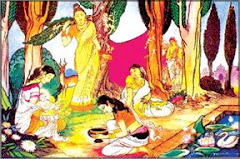
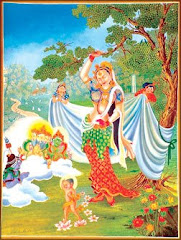
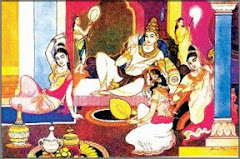

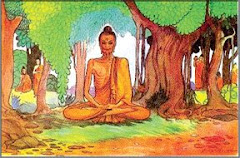



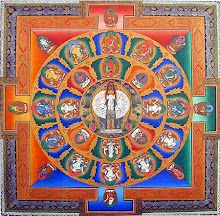
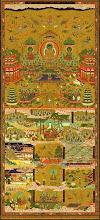
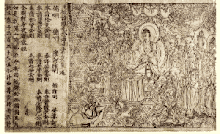
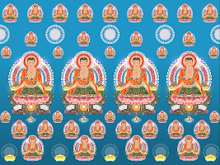

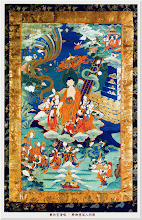

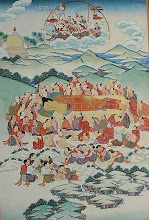


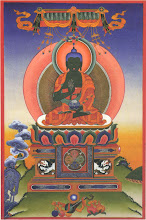




.jpg)

